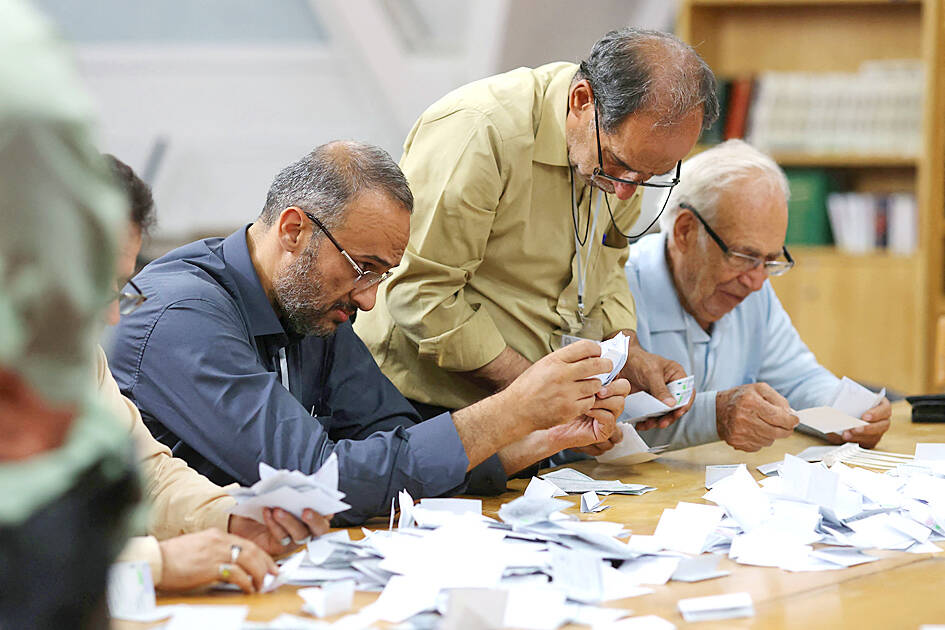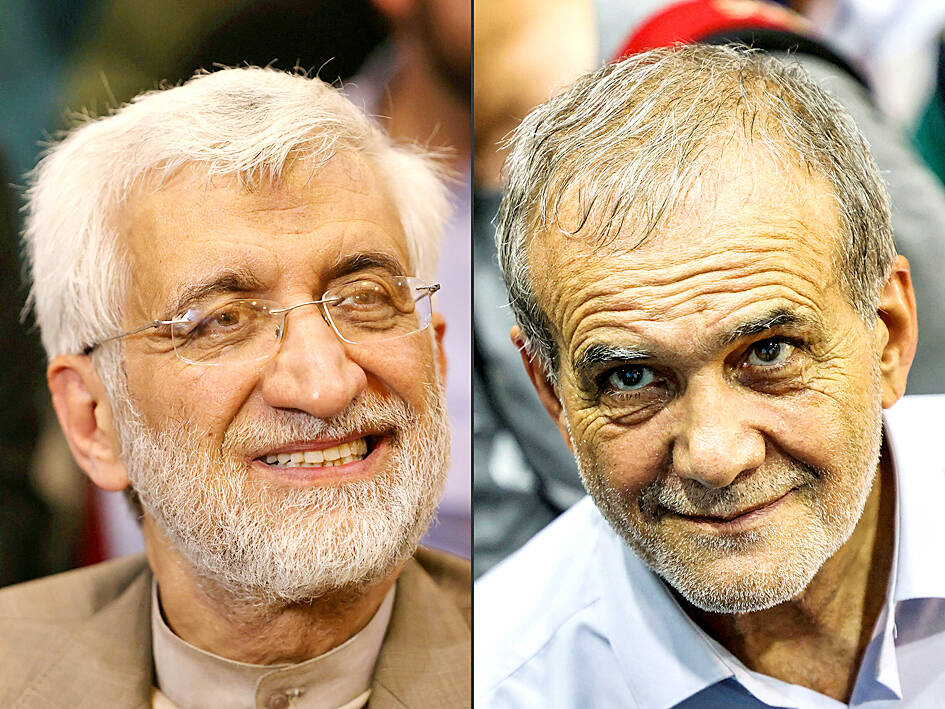The sole reformist in Iran’s presidential election, Masoud Pezeshkian, would face the ultraconservative Saeed Jalili in a runoff, authorities said yesterday, following a vote marred by historically low turnout.
Pezeshkian, 69, secured 42.4 percent of the vote, while Jalili, a 58-year-old former nuclear negotiator, finished second with 38.6 percent, Iranian Election Office spokesman Mohsen Eslami said.
Islamic Consultative Assembly Speaker Mohammad Bagher Ghalibaf was next with 13.8 percent of the vote, while the only other candidate, conservative cleric Mostafa Pourmohammadi, received less than 1 percent.

Photo: Majid Asgaripour / West Asia News Agency via Reuters
“None of the candidates could garner the absolute majority of the votes,” Eslami said, adding that those who finished first and second would face each other in a runoff on Friday next week.
Only slightly more than 40 percent of the 61 million electorate took part in Friday’s first round — a record low turnout for the Islamic republic.
The Election Office said that more than 1 million ballots were spoiled.

Photo: AFP
Out of Iran’s 13 previous presidential elections since the Islamic Revolution in 1979, only one has led to a runoff, which was in 2005.
The poll had been scheduled to take place next year, but was brought forward by the death of Iranian president Ebrahim Raisi in a helicopter crash last month.
The Guardian Council, which vets candidates, had originally approved six contenders, but a day before the election, two of them — Tehran Mayor Alireza Zakani and Iranian Vice President Amir-Hossein Ghazizadeh-Hashemi — dropped out.
Both candidates, after the release of the final results, asked their supporters to vote for Jalili in the runoff.
Ghalibaf followed suit later, asking “all revolutionary forces and supporters” to get behind Jalili’s bid for the presidency.
Friday’s vote took place amid heightened regional tensions over the Gaza war, a dispute with the West over Iran’s nuclear program and domestic discontent over the state of Iran’s sanctions-hit economy.
Iranian Supreme Leader Ayatollah Ali Khamenei had urged people to vote, while opposition groups, especially in the diaspora, called for a boycott, questioning the credibility of elections.
Pezeshkian is a heart surgeon who has represented the northern city of Tabriz in parliament since 2008.
He served as health minister under Iran’s previous reformist president Mohammad Khatami, who held office from 1997 to 2005 and has endorsed Pezeshkian’s bid in the current elections.
Pezeshkian criticized Raisi’s government for a lack of transparency during nationwide protests triggered by the September 2022 death in police custody of Mahsa Amini.
The 22-year-old Iranian Kurd had been arrested for allegedly contravening the country’s strict dress code for women.
In recent campaigning, Pezeshkian called for “constructive relations” with Washington and European countries to “get Iran out of its isolation.”
Jalili, Iran’s former nuclear negotiator, has maintained his uncompromising anti-West stance.
The 58-year-old has held several senior positions in the Islamic republic, including in Khamenei’s office in the early 2000s.
He is currently one of Khamenei’s representatives in the Supreme National Security Council, Iran’s highest security body.

NEXT GENERATION: The four plants in the Central Taiwan Science Park, designated Fab 25, would consist of four 1.4-nanometer wafer manufacturing plants, TSMC said Taiwan Semiconductor Manufacturing Co (TSMC, 台積電) plans to begin construction of four new plants later this year, with the aim to officially launch production of 2-nanometer semiconductor wafers by late 2028, Central Taiwan Science Park Bureau director-general Hsu Maw-shin (許茂新) said. Hsu made the announcement at an event on Friday evening celebrating the Central Taiwan Science Park’s 22nd anniversary. The second phase of the park’s expansion would commence with the initial construction of water detention ponds and other structures aimed at soil and water conservation, Hsu said. TSMC has officially leased the land, with the Central Taiwan Science Park having handed over the

AUKUS: The Australian Ambassador to the US said his country is working with the Pentagon and he is confident that submarine issues will be resolved Australian Ambassador to the US Kevin Rudd on Friday said that if Taiwan were to fall to China’s occupation, it would unleash China’s military capacities and capabilities more broadly. He also said his country is working with the Pentagon on the US Department of Defense’s review of the AUKUS submarine project and is confident that all issues raised will be resolved. Rudd, who served as Australian prime minister from 2007 to 2010 and for three months in 2013, made the remarks at the Aspen Security Forum in Colorado and stressed the longstanding US-Australia alliance and his close relationship with the US Undersecretary

‘WORLD WAR III’: Republican Representative Marjorie Taylor Greene said the aid would inflame tensions, but her amendment was rejected 421 votes against six The US House of Representatives on Friday passed the Department of Defense Appropriations Act for fiscal 2026, which includes US$500 million for Taiwan. The bill, which totals US$831.5 billion in discretionary spending, passed in a 221-209 vote. According to the bill, the funds for Taiwan would be administered by the US Defense Security Cooperation Agency and would remain available through Sept. 30, 2027, for the Taiwan Security Cooperation Initiative. The legislation authorizes the US Secretary of Defense, with the agreement of the US Secretary of State, to use the funds to assist Taiwan in procuring defense articles and services, and military training. Republican Representative

TAIWAN IS TAIWAN: US Representative Tom Tiffany said the amendment was not controversial, as ‘Taiwan is not — nor has it ever been — part of Communist China’ The US House of Representatives on Friday passed an amendment banning the US Department of Defense from creating, buying or displaying any map that shows Taiwan as part of the People’s Republic of China (PRC). The “Honest Maps” amendment was approved in a voice vote on Friday as part of the Department of Defense Appropriations Act for the 2026 fiscal year. The amendment prohibits using any funds from the act to create, buy or display maps that show Taiwan, Kinmen, Matsu, Penghu, Wuciou (烏坵), Green Island (綠島) or Orchid Island (Lanyu, 蘭嶼) as part of the PRC. The act includes US$831.5 billion in